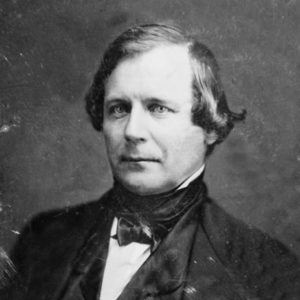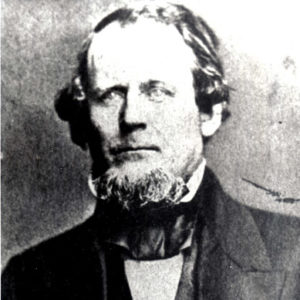calsfoundation@cals.org
William King Sebastian (1812–1865)
William Sebastian represented Arkansas in the U.S. Senate from 1848 until 1861. Also a farmer, lawyer, and judge, Sebastian served his state until the Civil War ended his career. Sebastian County, formed on January 6, 1851, was named for him.
William King Sebastian was born in Centerville, Tennessee, in 1812 to Samuel Sebastian and his wife. Records do not include the name of his mother or any siblings (he appears to be one of at least three children in the household in 1830.) or the exact date of his birth. Sebastian moved to Arkansas in 1835, living briefly in Monroe County before making his home in Helena (Phillips County).
While in Tennessee, Sebastian attended Columbia College, graduating in 1834. He also studied law and was admitted to the bar in both Tennessee and Arkansas. In 1838, he married Amelia Dunn of Helena; they had five children. Sebastian owned and operated cotton plantations in Phillips County while practicing law in Helena. He was also a member, in 1836, of a citizens’ “steering committee” seeking to provide law and order in the city of Helena.
Sebastian was elected a prosecuting attorney in Helena in 1837 and was then made a judge for the first circuit of Arkansas in 1840. In 1843, Governor Archibald Yell appointed Sebastian an associate judge of the Arkansas Supreme Court. Next, Sebastian was elected by the voters of Phillips County to serve in the Sixth General Assembly of Arkansas, which met from November 2 to December 23 of 1846. Sebastian was elected president of the Senate for that term and came in third in balloting for a seat in the U.S. Senate on November 9, 1846. Chester Ashley, who had been selected to fill the vacancy of that seat after the death of William Savin Fulton, was the winner of that balloting.
On April 29, 1848, the same Senate seat became vacant again at the death of Ashley, and Sebastian was a candidate once more for the office. At this time, both Senate seats were being discussed, as Ambrose Sevier was seeking to regain the seat he had resigned, and Solon Borland was fighting to keep that seat, to which he had been appointed. Borland eventually won the seat, after numerous ballots. The legislature then turned to Ashley’s seat. After the first ballot, Williamson S. Oldham of northwest Arkansas, supported by Borland, was the leading contender, but Sebastian, running as a Democrat, had come in second. During each of the following ballots, he gained support, and his election was assured when the Whigs in the assembly withdrew their candidate and voted for Sebastian.
Sebastian, at age thirty-six, was the youngest senator in the Thirtieth U.S. Congress. During his years in Washington DC, he served as chairman of the Committee on Manufactures and was also on the Committee on Indian Affairs. Historians tend to describe him as inactive or ineffectual in the Senate—one has written, “It was not Sebastian’s style to make much of an impression in the Senate”—but Sebastian was not entirely silent either. On January 3, 1849, on the Senate floor, he proposed a national highway that would run from Fort Smith (Sebastian County) to San Diego, California, by way of Santa Fe, New Mexico. In 1850, he fought for better law enforcement in the Indian Territory west of Arkansas. In early 1858, he sought federal funding for the survivors of the Mountain Meadows Massacre. The Arkansas General Assembly elected him to his first full term in the U.S. Senate in 1853—again, with the support of the Whig members of the legislature—and then repeated the favor in 1859, in spite of the fact that Thomas Hindman was then actively campaigning for that Senate seat.
At the beginning of the Civil War in 1861, most Southern senators resigned their seats in Congress, but Sebastian did not submit his resignation. He and nine others were expelled from the Senate on July 11, 1861. Sebastian returned to Helena and continued to practice law. In 1863, when much of Arkansas had been captured by the Union army and a new state government was being formed, Sebastian considered returning to the U.S. Senate. President Abraham Lincoln encouraged such a return, but Sebastian eventually chose against the attempt, correctly reasoning that the Senate would not accept his return under those circumstances. After Helena was captured by Union forces, Sebastian moved to Memphis, Tennessee, and practiced law there until his death on May 20, 1865.
In 1877, twelve years after his death, the U.S. Senate revoked its resolution of expulsion and paid compensation to Sebastian’s children.
For additional information:
Hallum, John. Biographical and Pictorial History of Arkansas. Albany, NY: Weed, Parsons, & Co., 1887.
“Sebastian, William King.” Biographical Directory of the United States Congress. http://bioguide.congress.gov/scripts/biodisplay.pl?index=S000216 (accessed June 22, 2023).
Steven Teske
CALS Encyclopedia of Arkansas
 Louisiana Purchase through Early Statehood, 1803 through 1860
Louisiana Purchase through Early Statehood, 1803 through 1860 Politics and Government
Politics and Government William Sebastian
William Sebastian  William Sebastian
William Sebastian 




Comments
No comments on this entry yet.